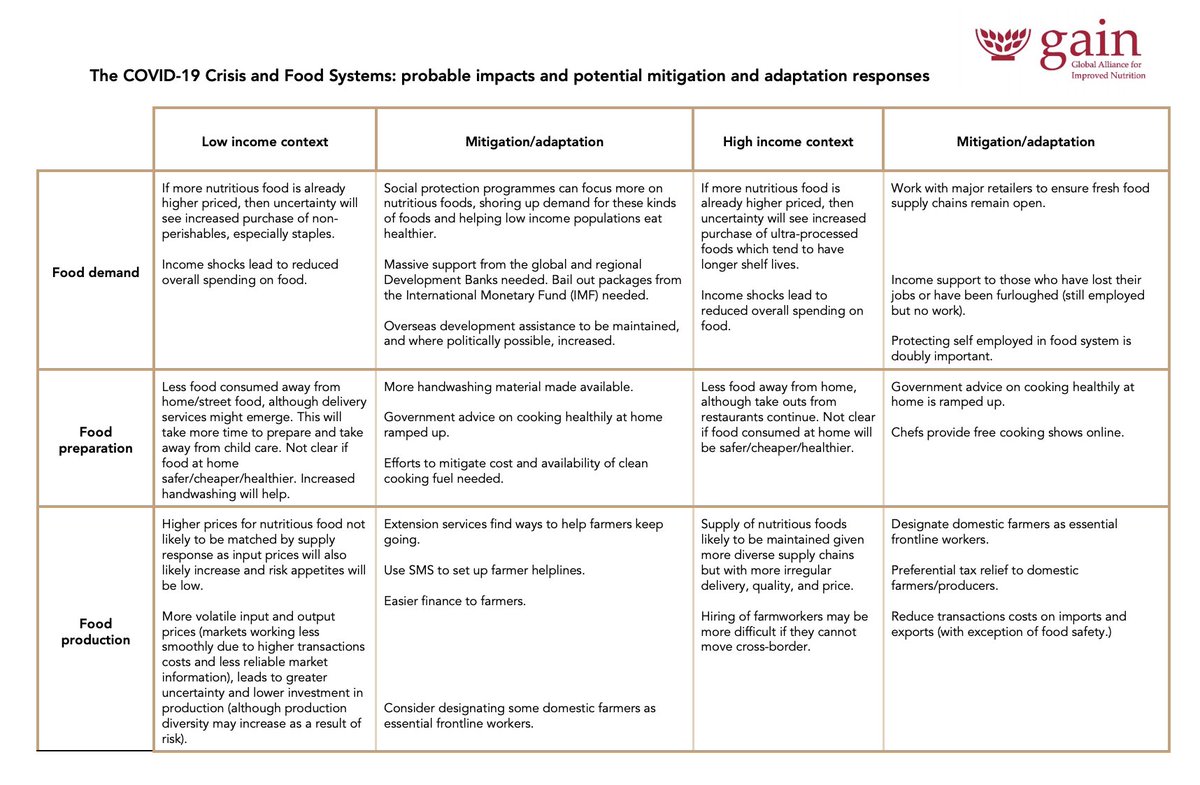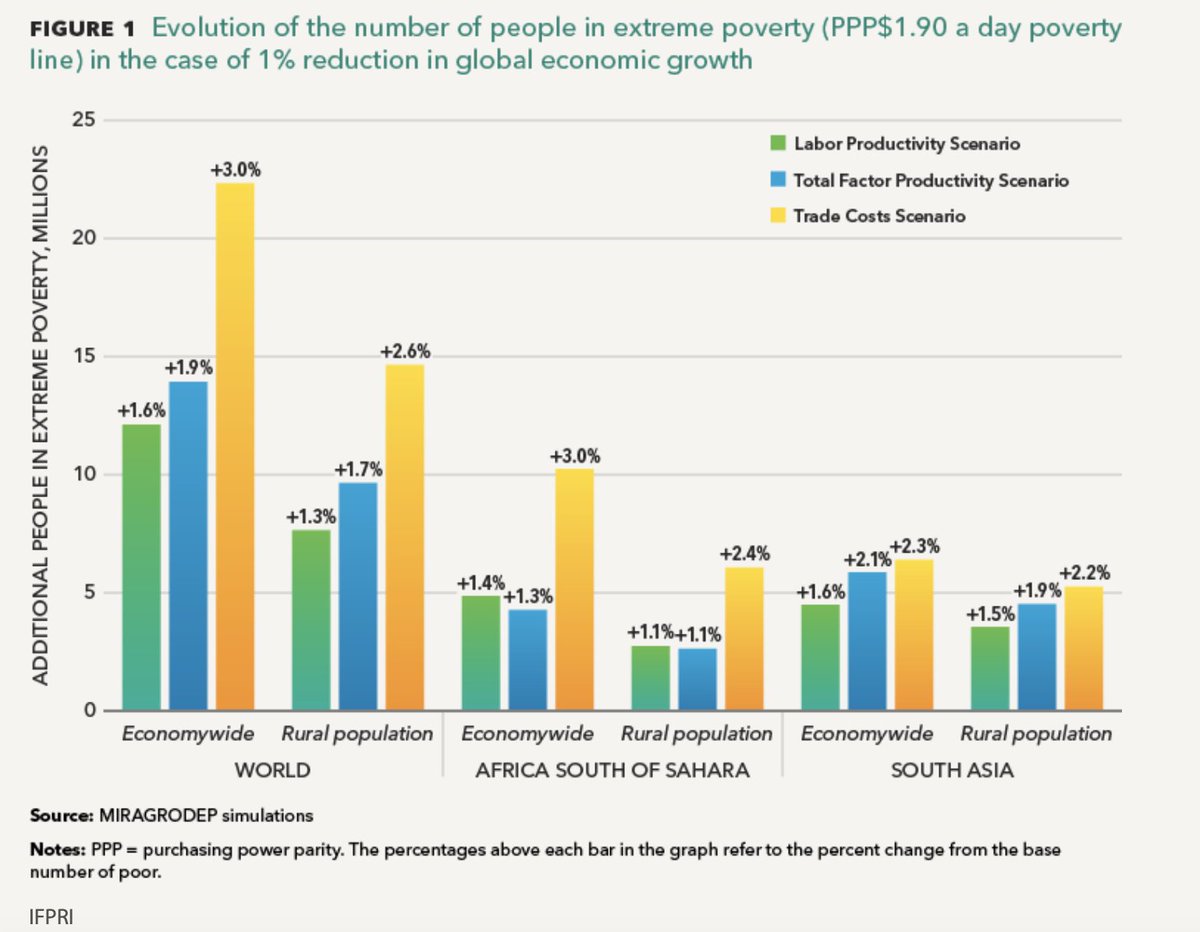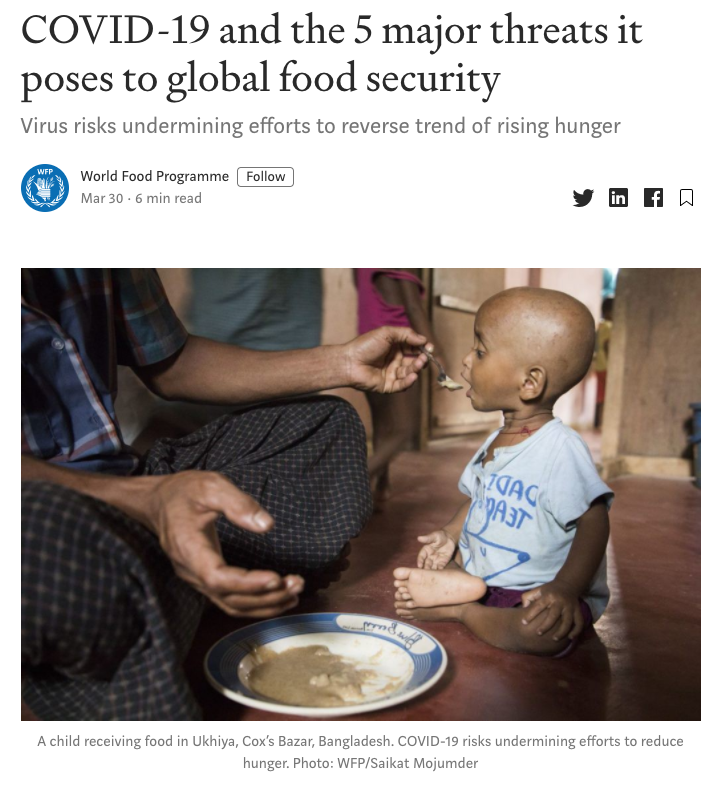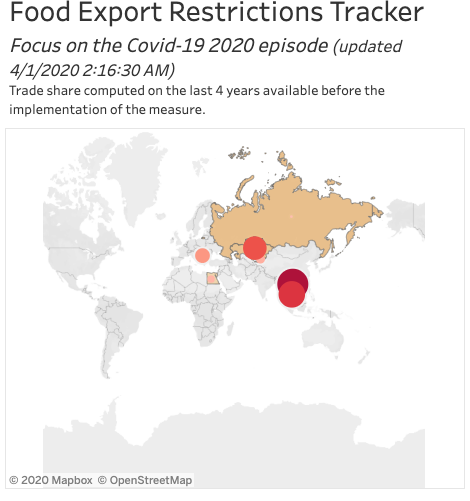Some information starting to emerge on how #COVID19 #coronavirus could impact global #foodsecurity. Here is my personal take:
THREAD 1/16
THREAD 1/16
Former @IFPRI DG, @ShenggenFan: "COVID-19 is a health crisis. But it could also lead to a food security crisis if proper measures are not taken.”
He& #39;s right.
Ebola, SARS, MERS all had direct & indirect negative impacts on food security.
See: https://www.ifpri.org/blog/preventing-global-food-security-crisis-under-covid-19-emergency
2/16">https://www.ifpri.org/blog/prev...
He& #39;s right.
Ebola, SARS, MERS all had direct & indirect negative impacts on food security.
See: https://www.ifpri.org/blog/preventing-global-food-security-crisis-under-covid-19-emergency
2/16">https://www.ifpri.org/blog/prev...
COVID-19 poses a great threat to nations with pervasive poverty & poor healthcare infrastructure. Most of world& #39;s hungry people live in these same places.
While the virus has been slow to spread to sub-Saharan Africa, its impact is imminent.
See: https://www.newscientist.com/article/2236760-we-dont-know-why-so-few-covid-19-cases-have-been-reported-in-africa/
3/16">https://www.newscientist.com/article/2...
While the virus has been slow to spread to sub-Saharan Africa, its impact is imminent.
See: https://www.newscientist.com/article/2236760-we-dont-know-why-so-few-covid-19-cases-have-been-reported-in-africa/
3/16">https://www.newscientist.com/article/2...
As of March 16th, at least 25 countries in Africa have reported confirmed cases of COVID-19.
See: https://experience.arcgis.com/experience/685d0ace521648f8a5beeeee1b9125cd
4/16">https://experience.arcgis.com/experienc...
See: https://experience.arcgis.com/experience/685d0ace521648f8a5beeeee1b9125cd
4/16">https://experience.arcgis.com/experienc...
Africa’s 1.2 billion people face the highest percentage of undernourishment on the planet, affecting over 20% of the population.
COVID-19 has proved especially deadly for health-compromised individuals. This will include people suffering from severe malnourishment.
5/16
COVID-19 has proved especially deadly for health-compromised individuals. This will include people suffering from severe malnourishment.
5/16
It is believed that the survival rate from Ebola was affected by what healthcare workers call “preceding nutritional status” or the baseline nutritional health of people affected by the virus.
We know this to be true of HIV patients as well.
See: https://apps.who.int/iris/bitstream/handle/10665/137425/9789241508056_eng.pdf
6/16">https://apps.who.int/iris/bits...
We know this to be true of HIV patients as well.
See: https://apps.who.int/iris/bitstream/handle/10665/137425/9789241508056_eng.pdf
6/16">https://apps.who.int/iris/bits...
Refugee populations in close proximity to one another and lacking adequate medical facilities are at especially elevated risk from COVID-19.
@UNHCR reports over 25m refugees today, many in camps in developing countries.
See: https://www.npr.org/sections/goatsandsoda/2020/03/11/814473308/opinion-refugees-are-especially-vulnerable-to-covid-19-dont-ignore-their-needs
7/16">https://www.npr.org/sections/...
@UNHCR reports over 25m refugees today, many in camps in developing countries.
See: https://www.npr.org/sections/goatsandsoda/2020/03/11/814473308/opinion-refugees-are-especially-vulnerable-to-covid-19-dont-ignore-their-needs
7/16">https://www.npr.org/sections/...
COVID-19 poses a great threat to nations lacking robust social safety nets. In the U.S., steps have already been taken to help kids maintain access to school meals.
These safety nets simply don& #39;t exist in exist in many developing countries.
8/16
These safety nets simply don& #39;t exist in exist in many developing countries.
8/16
In fact, less than 20 percent of people living in low-income countries have access to social protections of any kind.
See @WorldBank& #39;s work on this here: http://documents.worldbank.org/curated/en/427871521040513398/pdf/124300-PUB-PUBLIC.pdf
9/16">https://documents.worldbank.org/curated/e...
See @WorldBank& #39;s work on this here: http://documents.worldbank.org/curated/en/427871521040513398/pdf/124300-PUB-PUBLIC.pdf
9/16">https://documents.worldbank.org/curated/e...
COVID-19 may cause breaks in food supply chains, food shortages and food price spikes.
During the Ebola outbreak in 2014, the price of some staple foods in West African increased by over 100 percent.
See: https://www.telegraph.co.uk/global-health/science-and-disease/coronavirus-disrupts-staple-crop-production-impact-food-security1/
10/16">https://www.telegraph.co.uk/global-he...
During the Ebola outbreak in 2014, the price of some staple foods in West African increased by over 100 percent.
See: https://www.telegraph.co.uk/global-health/science-and-disease/coronavirus-disrupts-staple-crop-production-impact-food-security1/
10/16">https://www.telegraph.co.uk/global-he...
While food supplies & prices have remained stable to-date (staple prices are even down slightly), animal feed & high-value food product supply chains are being affected.
Broader supply breaks are likely.
See this from @RobVos26 & team @IFPRI: https://www.ifpri.org/blog/covid-19-spreads-no-major-concern-global-food-security-yet
11/16">https://www.ifpri.org/blog/covi...
Broader supply breaks are likely.
See this from @RobVos26 & team @IFPRI: https://www.ifpri.org/blog/covid-19-spreads-no-major-concern-global-food-security-yet
11/16">https://www.ifpri.org/blog/covi...
The food price spikes of 2007/8 show that export restrictions, market speculation & panic behavior were, in part, responsible for the dramatic increase in global food prices in that period.
We are not protected against these measures today.
See: https://www.odi.org/sites/odi.org.uk/files/odi-assets/publications-opinion-files/6103.pdf
12/16">https://www.odi.org/sites/odi...
We are not protected against these measures today.
See: https://www.odi.org/sites/odi.org.uk/files/odi-assets/publications-opinion-files/6103.pdf
12/16">https://www.odi.org/sites/odi...
In developing countries, many families already spend upwards of half of their income on food. Countries that rely heavily on imported food to meet demand—including sub-Saharan Africa—face disproportionate risk from supply chain failures.
13/16
13/16
COVID-19 may cause the global economy to slow or fall into recession, exacerbating extreme poverty and hunger.
@OECD has has dramatically revised their projections for global GDP growth this year.
See: https://www.nytimes.com/2020/03/02/business/economy/global-economy-coronavirus.html
14/16">https://www.nytimes.com/2020/03/0...
@OECD has has dramatically revised their projections for global GDP growth this year.
See: https://www.nytimes.com/2020/03/02/business/economy/global-economy-coronavirus.html
14/16">https://www.nytimes.com/2020/03/0...
We know from the latest #SOFI report that economic decline, poverty and food insecurity often accompany one another.
"Hunger has increased in many countries where the economy has slowed down or contracted."
See: https://docs.wfp.org/api/documents/WFP-0000106763/download/?_ga=2.148785906.454478674.1584113625-1018911202.1579039603
15/16">https://docs.wfp.org/api/docum...
"Hunger has increased in many countries where the economy has slowed down or contracted."
See: https://docs.wfp.org/api/documents/WFP-0000106763/download/?_ga=2.148785906.454478674.1584113625-1018911202.1579039603
15/16">https://docs.wfp.org/api/docum...
Entering 2020, the number of hungry and malnourishment people around the world was already on the rise. COVID-19, risks frustrating the efforts of humanitarian and food security organizations seeking to reverse these trends.
Let& #39;s keep diligent.
END 16/16
Let& #39;s keep diligent.
END 16/16
All of this #COVID19 #foodsecurity information in one spot at @WFPUSA.
 https://abs.twimg.com/emoji/v2/... draggable="false" alt="➡️" title="Rightwards arrow" aria-label="Emoji: Rightwards arrow"> https://www.wfpusa.org/articles/covid-19-and-global-food-security/">https://www.wfpusa.org/articles/...
https://abs.twimg.com/emoji/v2/... draggable="false" alt="➡️" title="Rightwards arrow" aria-label="Emoji: Rightwards arrow"> https://www.wfpusa.org/articles/covid-19-and-global-food-security/">https://www.wfpusa.org/articles/...
More on #COVID19 #foodsecurity from @WFP’s Chief Economist, Arif Husain ( @WFPChiefEcon):
 https://abs.twimg.com/emoji/v2/... draggable="false" alt="➡️" title="Rightwards arrow" aria-label="Emoji: Rightwards arrow"> https://insight.wfp.org/how-to-minimize-the-impact-of-coronavirus-on-food-security-be2fa7885d7e">https://insight.wfp.org/how-to-mi...
https://abs.twimg.com/emoji/v2/... draggable="false" alt="➡️" title="Rightwards arrow" aria-label="Emoji: Rightwards arrow"> https://insight.wfp.org/how-to-minimize-the-impact-of-coronavirus-on-food-security-be2fa7885d7e">https://insight.wfp.org/how-to-mi...
Will keep these coming on this thread:
Another good resource on #COVID19 and global #foodsecurity from @USAID& #39;s Bureau for Resilience and Food Security.
 https://abs.twimg.com/emoji/v2/... draggable="false" alt="➡️" title="Rightwards arrow" aria-label="Emoji: Rightwards arrow"> https://www.agrilinks.org/post/coronavirus-and-implications-food-systems-and-policy">https://www.agrilinks.org/post/coro...
https://abs.twimg.com/emoji/v2/... draggable="false" alt="➡️" title="Rightwards arrow" aria-label="Emoji: Rightwards arrow"> https://www.agrilinks.org/post/coronavirus-and-implications-food-systems-and-policy">https://www.agrilinks.org/post/coro...
Another good resource on #COVID19 and global #foodsecurity from @USAID& #39;s Bureau for Resilience and Food Security.
As Malaysia restricts travel from #COVID19, Singapore considers its #foodsecurity prospects. Some panic buying at supermarkets.
The country, which imports 90% of its food, has stockpiled food for three months and has diversified its trading partners.
 https://abs.twimg.com/emoji/v2/... draggable="false" alt="➡️" title="Rightwards arrow" aria-label="Emoji: Rightwards arrow"> https://www.straitstimes.com/singapore/environment/the-people-in-singapore-will-not-go-hungry-food-security-expert">https://www.straitstimes.com/singapore...
https://abs.twimg.com/emoji/v2/... draggable="false" alt="➡️" title="Rightwards arrow" aria-label="Emoji: Rightwards arrow"> https://www.straitstimes.com/singapore/environment/the-people-in-singapore-will-not-go-hungry-food-security-expert">https://www.straitstimes.com/singapore...
The country, which imports 90% of its food, has stockpiled food for three months and has diversified its trading partners.
Despite the title of this piece, reasons to be optimistic about #COVID19 & #foodsecurity in sub-Saharan Africa:
1) Youngest population on earth
2) Many rural, sparsely populated areas
3) Not transmitted through livestock
4) High temps may slow virus
 https://abs.twimg.com/emoji/v2/... draggable="false" alt="➡️" title="Rightwards arrow" aria-label="Emoji: Rightwards arrow"> https://www.sciencemag.org/news/2020/03/ticking-time-bomb-scientists-worry-about-coronavirus-spread-africa">https://www.sciencemag.org/news/2020...
https://abs.twimg.com/emoji/v2/... draggable="false" alt="➡️" title="Rightwards arrow" aria-label="Emoji: Rightwards arrow"> https://www.sciencemag.org/news/2020/03/ticking-time-bomb-scientists-worry-about-coronavirus-spread-africa">https://www.sciencemag.org/news/2020...
1) Youngest population on earth
2) Many rural, sparsely populated areas
3) Not transmitted through livestock
4) High temps may slow virus
The average American has three days of fresh food reserves—"we are all only ever nine meals from anarchy.”
The perils of our "just enough, just in time" global food system in the face of #COVID19 via @ConversationUS
 https://abs.twimg.com/emoji/v2/... draggable="false" alt="➡️" title="Rightwards arrow" aria-label="Emoji: Rightwards arrow"> http://theconversation.com/coronavirus-the-perils-of-our-just-enough-just-in-time-food-system-133724just">https://theconversation.com/coronavir...
https://abs.twimg.com/emoji/v2/... draggable="false" alt="➡️" title="Rightwards arrow" aria-label="Emoji: Rightwards arrow"> http://theconversation.com/coronavirus-the-perils-of-our-just-enough-just-in-time-food-system-133724just">https://theconversation.com/coronavir...
The perils of our "just enough, just in time" global food system in the face of #COVID19 via @ConversationUS
“Authorities [in Venezuela] were stopping producers from delivering food across the whole country, and so far the government had not issued them with any sort of permission to pass through checkpoints unhindered.”
#COVID19 #foodsecurity
 https://abs.twimg.com/emoji/v2/... draggable="false" alt="➡️" title="Rightwards arrow" aria-label="Emoji: Rightwards arrow"> https://www.reuters.com/article/us-health-coronavirus-venezuela-idUSKBN2143QY">https://www.reuters.com/article/u...
https://abs.twimg.com/emoji/v2/... draggable="false" alt="➡️" title="Rightwards arrow" aria-label="Emoji: Rightwards arrow"> https://www.reuters.com/article/us-health-coronavirus-venezuela-idUSKBN2143QY">https://www.reuters.com/article/u...
#COVID19 #foodsecurity
Important reminder from @nprDanCharles that while restaurants shutter, “food producers, are operating almost as normal — at least for now” with thousands of H-2A workers risking illness to provide critical farm labor this season.
 https://abs.twimg.com/emoji/v2/... draggable="false" alt="➡️" title="Rightwards arrow" aria-label="Emoji: Rightwards arrow"> https://www.npr.org/2020/03/18/816644358/covid-19-threatens-food-supply-chain-as-farms-worry-about-workers-falling-ill">https://www.npr.org/2020/03/1...
https://abs.twimg.com/emoji/v2/... draggable="false" alt="➡️" title="Rightwards arrow" aria-label="Emoji: Rightwards arrow"> https://www.npr.org/2020/03/18/816644358/covid-19-threatens-food-supply-chain-as-farms-worry-about-workers-falling-ill">https://www.npr.org/2020/03/1...
Global food stocks look O.K. in the face of #coronavirus #COVID19 according to @FAO. Estimated 3 month buffer of cereals.
NOT evenly distributed, of course. 34 of 44 countries requiring external trade or humanitarian assistance are in Africa.
See: http://www.fao.org/worldfoodsituation/csdb/en/">https://www.fao.org/worldfood...
NOT evenly distributed, of course. 34 of 44 countries requiring external trade or humanitarian assistance are in Africa.
See: http://www.fao.org/worldfoodsituation/csdb/en/">https://www.fao.org/worldfood...
Important words from Jacob Kurtzer of @CSISHumAgenda on the impacts of #COVID19 #coronavirus on humanitarian organizations and those in desperate need of assistance around the world.
 https://abs.twimg.com/emoji/v2/... draggable="false" alt="👉" title="Right pointing backhand index" aria-label="Emoji: Right pointing backhand index"> http://csis.org/analysis/impact-covid-19-humanitarian-crises">https://csis.org/analysis/...
https://abs.twimg.com/emoji/v2/... draggable="false" alt="👉" title="Right pointing backhand index" aria-label="Emoji: Right pointing backhand index"> http://csis.org/analysis/impact-covid-19-humanitarian-crises">https://csis.org/analysis/...
More coming now from @l_haddad @CorinnaHawkes @jessfanzo and others on the global #foodsecurity impacts of #COVID19.
This is the launch of a blog series and a @NutritionConnex landing page, so keep tuning in at @GAINalliance.
 https://abs.twimg.com/emoji/v2/... draggable="false" alt="➡️" title="Rightwards arrow" aria-label="Emoji: Rightwards arrow"> https://www.gainhealth.org/media/news/covid-19-crisis-and-food-systems-addressing-threats-creating-opportunities">https://www.gainhealth.org/media/new...
https://abs.twimg.com/emoji/v2/... draggable="false" alt="➡️" title="Rightwards arrow" aria-label="Emoji: Rightwards arrow"> https://www.gainhealth.org/media/news/covid-19-crisis-and-food-systems-addressing-threats-creating-opportunities">https://www.gainhealth.org/media/new...
This is the launch of a blog series and a @NutritionConnex landing page, so keep tuning in at @GAINalliance.
Two insights re: #foodsecurity & #COVID19 from
@IFPRI modeling:
1. A 1% reduction in global economic growth may increase global extreme poverty by 1.7%-3%.
2. A 1% slowdown could cause a decline in developing-country agri-food exports of almost 25%.
 https://abs.twimg.com/emoji/v2/... draggable="false" alt="➡️" title="Rightwards arrow" aria-label="Emoji: Rightwards arrow"> https://www.ifpri.org/blog/how-much-will-global-poverty-increase-because-covid-19">https://www.ifpri.org/blog/how-...
https://abs.twimg.com/emoji/v2/... draggable="false" alt="➡️" title="Rightwards arrow" aria-label="Emoji: Rightwards arrow"> https://www.ifpri.org/blog/how-much-will-global-poverty-increase-because-covid-19">https://www.ifpri.org/blog/how-...
@IFPRI modeling:
1. A 1% reduction in global economic growth may increase global extreme poverty by 1.7%-3%.
2. A 1% slowdown could cause a decline in developing-country agri-food exports of almost 25%.
Our friends @USGLC on the global #foodsecurity impacts of #COVID19.
As their Advisory Council chairs write, "No matter how successful we are in fighting the threat at home, we will never stop it unless we are also fighting it around the world."
 https://abs.twimg.com/emoji/v2/... draggable="false" alt="👉" title="Right pointing backhand index" aria-label="Emoji: Right pointing backhand index"> https://www.usglc.org/blog/impact-of-coronavirus-on-global-hunger/">https://www.usglc.org/blog/impa...
https://abs.twimg.com/emoji/v2/... draggable="false" alt="👉" title="Right pointing backhand index" aria-label="Emoji: Right pointing backhand index"> https://www.usglc.org/blog/impact-of-coronavirus-on-global-hunger/">https://www.usglc.org/blog/impa...
As their Advisory Council chairs write, "No matter how successful we are in fighting the threat at home, we will never stop it unless we are also fighting it around the world."
"The flour is in production and the mills are running fine. People shouldn’t be concerned about supply. It’s a demand issue."
More affirmation from growers and millers in North America that the food system is working.
 https://abs.twimg.com/emoji/v2/... draggable="false" alt="👉" title="Right pointing backhand index" aria-label="Emoji: Right pointing backhand index"> https://uk.reuters.com/article/us-health-coronavirus-wheat/north-american-millers-bakers-scramble-to-satisfy-bread-buying-binge-idUKKBN21A30P">https://uk.reuters.com/article/u...
https://abs.twimg.com/emoji/v2/... draggable="false" alt="👉" title="Right pointing backhand index" aria-label="Emoji: Right pointing backhand index"> https://uk.reuters.com/article/us-health-coronavirus-wheat/north-american-millers-bakers-scramble-to-satisfy-bread-buying-binge-idUKKBN21A30P">https://uk.reuters.com/article/u...
More affirmation from growers and millers in North America that the food system is working.
One of the first examples of food prices increases from #COVID19.
@AlJazeera reporting that some food prices in Khartoum, Sudan have more than tripled since the first case was reported.
 https://abs.twimg.com/emoji/v2/... draggable="false" alt="➡️" title="Rightwards arrow" aria-label="Emoji: Rightwards arrow"> https://www.aljazeera.com/news/2020/03/coronavirus-sudan-food-medical-supplies-short-supply-200318131141974.html">https://www.aljazeera.com/news/2020...
https://abs.twimg.com/emoji/v2/... draggable="false" alt="➡️" title="Rightwards arrow" aria-label="Emoji: Rightwards arrow"> https://www.aljazeera.com/news/2020/03/coronavirus-sudan-food-medical-supplies-short-supply-200318131141974.html">https://www.aljazeera.com/news/2020...
@AlJazeera reporting that some food prices in Khartoum, Sudan have more than tripled since the first case was reported.
Rwanda is also seeing food price increases from #COVID19.
"Late on Monday, the trade ministry fixed prices for 17 food items including rice, sugar and cooking oil."
Panic buying, hoarding, and price gauging to blame.
 https://abs.twimg.com/emoji/v2/... draggable="false" alt="➡️" title="Rightwards arrow" aria-label="Emoji: Rightwards arrow"> https://www.dw.com/en/price-hikes-in-africa-aggravate-the-coronavirus-crisis/a-52820553">https://www.dw.com/en/price-...
https://abs.twimg.com/emoji/v2/... draggable="false" alt="➡️" title="Rightwards arrow" aria-label="Emoji: Rightwards arrow"> https://www.dw.com/en/price-hikes-in-africa-aggravate-the-coronavirus-crisis/a-52820553">https://www.dw.com/en/price-...
"Late on Monday, the trade ministry fixed prices for 17 food items including rice, sugar and cooking oil."
Panic buying, hoarding, and price gauging to blame.
This is a headline that I have been dreading since #COVID19 emerged.
Protectionism in the face of a food “crisis” produces nothing but hunger.
But there is still time to ensure that food moves freely between markets & those most vulnerable remain fed. https://www.bloomberg.com/news/articles/2020-03-24/countries-are-starting-to-hoard-food-threatening-global-trade">https://www.bloomberg.com/news/arti...
Protectionism in the face of a food “crisis” produces nothing but hunger.
But there is still time to ensure that food moves freely between markets & those most vulnerable remain fed. https://www.bloomberg.com/news/articles/2020-03-24/countries-are-starting-to-hoard-food-threatening-global-trade">https://www.bloomberg.com/news/arti...
"Vietnam, the third largest rice exporter, and Kazakhstan, the number nine wheat exporter, have already made moves to restrict sales of those staples amid concerns over domestic availability."
#COVID19 #foodsecurity
 https://abs.twimg.com/emoji/v2/... draggable="false" alt="👉" title="Right pointing backhand index" aria-label="Emoji: Right pointing backhand index"> https://www.agriculture.com/markets/newswire/world-food-security-at-risk-as-exporters-curb-sales-importers-buy-more?hid=0a5b30cb11dfd1c2ba38a4c09d8624e40fdc564a&did=505864-20200326&utm_campaign=todays-news_newsletter&utm_source=agriculture.com&utm_medium=email&utm_content=032620&cid=505864&mid=31387930181#">https://www.agriculture.com/markets/n...
https://abs.twimg.com/emoji/v2/... draggable="false" alt="👉" title="Right pointing backhand index" aria-label="Emoji: Right pointing backhand index"> https://www.agriculture.com/markets/newswire/world-food-security-at-risk-as-exporters-curb-sales-importers-buy-more?hid=0a5b30cb11dfd1c2ba38a4c09d8624e40fdc564a&did=505864-20200326&utm_campaign=todays-news_newsletter&utm_source=agriculture.com&utm_medium=email&utm_content=032620&cid=505864&mid=31387930181#">https://www.agriculture.com/markets/n...
#COVID19 #foodsecurity
“The worst that can happen is that governments restrict the flow of food."
@MaximoTorero @FAO is right. This isn& #39;t 2008, supply is ample but concentrated in certain countries.
Trade helps break it loose, avoiding price spikes and, ultimately, hunger.
 https://abs.twimg.com/emoji/v2/... draggable="false" alt="➡️" title="Rightwards arrow" aria-label="Emoji: Rightwards arrow"> https://www.theguardian.com/global-development/2020/mar/26/coronavirus-measures-could-cause-global-food-shortage-un-warns">https://www.theguardian.com/global-de...
https://abs.twimg.com/emoji/v2/... draggable="false" alt="➡️" title="Rightwards arrow" aria-label="Emoji: Rightwards arrow"> https://www.theguardian.com/global-development/2020/mar/26/coronavirus-measures-could-cause-global-food-shortage-un-warns">https://www.theguardian.com/global-de...
@MaximoTorero @FAO is right. This isn& #39;t 2008, supply is ample but concentrated in certain countries.
Trade helps break it loose, avoiding price spikes and, ultimately, hunger.
The first post in the @NutritionConnex series on #COVID2019 and #FoodSystems by @FAO Chief Economist @MaximoTorero.
1) Safety nets
2) Free trade
3) Invest in supply chains
4) Support farmers to keep growing
@l_haddad of @GAINalliance with the assist.
 https://abs.twimg.com/emoji/v2/... draggable="false" alt="👉" title="Right pointing backhand index" aria-label="Emoji: Right pointing backhand index"> https://nutritionconnect.org/resource-center/covid-19-and-food-supply-four-pronged-battle-plan-countries">https://nutritionconnect.org/resource-...
https://abs.twimg.com/emoji/v2/... draggable="false" alt="👉" title="Right pointing backhand index" aria-label="Emoji: Right pointing backhand index"> https://nutritionconnect.org/resource-center/covid-19-and-food-supply-four-pronged-battle-plan-countries">https://nutritionconnect.org/resource-...
1) Safety nets
2) Free trade
3) Invest in supply chains
4) Support farmers to keep growing
@l_haddad of @GAINalliance with the assist.
Acting Director of @WFP Supply Chain:
" @WHO continues to advocate for no restrictions to transport and trade, however countries will act based on their own risk assessment, and some supply chains may be disrupted."
Read more https://abs.twimg.com/emoji/v2/... draggable="false" alt="➡️" title="Rightwards arrow" aria-label="Emoji: Rightwards arrow"> https://www.unocha.org/sites/unocha/files/Global-Humanitarian-Response-Plan-COVID-19.pdf">https://www.unocha.org/sites/uno...
https://abs.twimg.com/emoji/v2/... draggable="false" alt="➡️" title="Rightwards arrow" aria-label="Emoji: Rightwards arrow"> https://www.unocha.org/sites/unocha/files/Global-Humanitarian-Response-Plan-COVID-19.pdf">https://www.unocha.org/sites/uno...
" @WHO continues to advocate for no restrictions to transport and trade, however countries will act based on their own risk assessment, and some supply chains may be disrupted."
Read more
"Experience from other infectious disease outbreaks makes clear that malnourished individuals have a higher risk of becoming ill, a longer duration of illness, and greater risk of death."
Read more on this from @WFPUSA board member @DanRGlickman.
 https://abs.twimg.com/emoji/v2/... draggable="false" alt="👉" title="Right pointing backhand index" aria-label="Emoji: Right pointing backhand index"> https://www.cnn.com/2020/03/27/opinions/healthy-diet-immune-system-covid-19-mozaffarian-glickman-nikbin-meydani/index.html">https://www.cnn.com/2020/03/2...
https://abs.twimg.com/emoji/v2/... draggable="false" alt="👉" title="Right pointing backhand index" aria-label="Emoji: Right pointing backhand index"> https://www.cnn.com/2020/03/27/opinions/healthy-diet-immune-system-covid-19-mozaffarian-glickman-nikbin-meydani/index.html">https://www.cnn.com/2020/03/2...
Read more on this from @WFPUSA board member @DanRGlickman.
The latest from @JoeGlauber1, @RobVos26, Will Martin and David Laborde of @IFPRI on #COVID19 impacts on global food prices.
A reminder: this does NOT have to be 2007/8 all over again. Global markets are well supplied.
 https://abs.twimg.com/emoji/v2/... draggable="false" alt="➡️" title="Rightwards arrow" aria-label="Emoji: Rightwards arrow"> https://www.ifpri.org/blog/covid-19-trade-restrictions-are-worst-possible-response-safeguard-food-security">https://www.ifpri.org/blog/covi...
https://abs.twimg.com/emoji/v2/... draggable="false" alt="➡️" title="Rightwards arrow" aria-label="Emoji: Rightwards arrow"> https://www.ifpri.org/blog/covid-19-trade-restrictions-are-worst-possible-response-safeguard-food-security">https://www.ifpri.org/blog/covi...
A reminder: this does NOT have to be 2007/8 all over again. Global markets are well supplied.
While global food markets are well supplied in the face of #COVID19, this does NOT always protect vulnerable populations in their own markets.
Border closings, unscrupulous traders, hoarding and panic buying will affect food ACCESS.
Reminder from Sudan https://abs.twimg.com/emoji/v2/... draggable="false" alt="👉" title="Right pointing backhand index" aria-label="Emoji: Right pointing backhand index"> https://www.dabangasudan.org/en/all-news/article/prices-soar-across-sudan-as-coronavirus-measures-bite">https://www.dabangasudan.org/en/all-ne...
https://abs.twimg.com/emoji/v2/... draggable="false" alt="👉" title="Right pointing backhand index" aria-label="Emoji: Right pointing backhand index"> https://www.dabangasudan.org/en/all-news/article/prices-soar-across-sudan-as-coronavirus-measures-bite">https://www.dabangasudan.org/en/all-ne...
Border closings, unscrupulous traders, hoarding and panic buying will affect food ACCESS.
Reminder from Sudan
Glad to have @cullenhendrix of @sie_center @PIIE adding his voice to this important conversation.
"Export restrictions are blunt instruments that further exacerbate the problems they were designed to address."
Read more here https://abs.twimg.com/emoji/v2/... draggable="false" alt="➡️" title="Rightwards arrow" aria-label="Emoji: Rightwards arrow"> https://www.piie.com/blogs/realtime-economic-issues-watch/wrong-tools-wrong-time-food-export-bans-time-covid-19">https://www.piie.com/blogs/rea...
https://abs.twimg.com/emoji/v2/... draggable="false" alt="➡️" title="Rightwards arrow" aria-label="Emoji: Rightwards arrow"> https://www.piie.com/blogs/realtime-economic-issues-watch/wrong-tools-wrong-time-food-export-bans-time-covid-19">https://www.piie.com/blogs/rea...
"Export restrictions are blunt instruments that further exacerbate the problems they were designed to address."
Read more here
Wheat & rice prices rising on global markets as countries stockpile. No reason to panic (talking to you, governments), a natural response to increased demand from millers trying to restock shelves & import-reliant countries doing what they do.
Read more https://abs.twimg.com/emoji/v2/... draggable="false" alt="➡️" title="Rightwards arrow" aria-label="Emoji: Rightwards arrow"> https://www.wsj.com/articles/wheat-and-rice-prices-surgein-coronavirus-lockdown-11585598044">https://www.wsj.com/articles/...
https://abs.twimg.com/emoji/v2/... draggable="false" alt="➡️" title="Rightwards arrow" aria-label="Emoji: Rightwards arrow"> https://www.wsj.com/articles/wheat-and-rice-prices-surgein-coronavirus-lockdown-11585598044">https://www.wsj.com/articles/...
Read more
. @WFP @WFPUSA have been sounding the alarm on #COVID19 & global #foodsecurity because it will disproportionately affect places with:
1. Limited healthcare infr.
2. No safety nets
3. Malnourished people
4. Reliance on food imports
5. Pervasive poverty
 https://abs.twimg.com/emoji/v2/... draggable="false" alt="👉" title="Right pointing backhand index" aria-label="Emoji: Right pointing backhand index"> https://insight.wfp.org/covid-19-and-the-5-major-threats-it-poses-to-global-food-security-1c4da2ff6657">https://insight.wfp.org/covid-19-...
https://abs.twimg.com/emoji/v2/... draggable="false" alt="👉" title="Right pointing backhand index" aria-label="Emoji: Right pointing backhand index"> https://insight.wfp.org/covid-19-and-the-5-major-threats-it-poses-to-global-food-security-1c4da2ff6657">https://insight.wfp.org/covid-19-...
1. Limited healthcare infr.
2. No safety nets
3. Malnourished people
4. Reliance on food imports
5. Pervasive poverty
If you& #39;re not following @IFPRI& #39;s Food Export Restrictions Tracker, you should.
Good data is key to protecting against an unnecessary global food price crisis in a time of abundance.
As of today, 0.64% of calories under restriction.
Check it out https://abs.twimg.com/emoji/v2/... draggable="false" alt="👉" title="Right pointing backhand index" aria-label="Emoji: Right pointing backhand index"> https://public.tableau.com/profile/laborde6680#!/vizhome/ExportRestrictionsTracker/FoodExportRestrictionsTracker">https://public.tableau.com/profile/l...
https://abs.twimg.com/emoji/v2/... draggable="false" alt="👉" title="Right pointing backhand index" aria-label="Emoji: Right pointing backhand index"> https://public.tableau.com/profile/laborde6680#!/vizhome/ExportRestrictionsTracker/FoodExportRestrictionsTracker">https://public.tableau.com/profile/l...
Good data is key to protecting against an unnecessary global food price crisis in a time of abundance.
As of today, 0.64% of calories under restriction.
Check it out

 Read on Twitter
Read on Twitter
 https://www.gainhealth.org/media/new..." title="More coming now from @l_haddad @CorinnaHawkes @jessfanzo and others on the global #foodsecurity impacts of #COVID19. This is the launch of a blog series and a @NutritionConnex landing page, so keep tuning in at @GAINalliance. https://abs.twimg.com/emoji/v2/... draggable="false" alt="➡️" title="Rightwards arrow" aria-label="Emoji: Rightwards arrow"> https://www.gainhealth.org/media/new..." class="img-responsive" style="max-width:100%;"/>
https://www.gainhealth.org/media/new..." title="More coming now from @l_haddad @CorinnaHawkes @jessfanzo and others on the global #foodsecurity impacts of #COVID19. This is the launch of a blog series and a @NutritionConnex landing page, so keep tuning in at @GAINalliance. https://abs.twimg.com/emoji/v2/... draggable="false" alt="➡️" title="Rightwards arrow" aria-label="Emoji: Rightwards arrow"> https://www.gainhealth.org/media/new..." class="img-responsive" style="max-width:100%;"/>
 https://www.ifpri.org/blog/how-..." title="Two insights re: #foodsecurity & #COVID19 from @IFPRI modeling:1. A 1% reduction in global economic growth may increase global extreme poverty by 1.7%-3%.2. A 1% slowdown could cause a decline in developing-country agri-food exports of almost 25%.https://abs.twimg.com/emoji/v2/... draggable="false" alt="➡️" title="Rightwards arrow" aria-label="Emoji: Rightwards arrow"> https://www.ifpri.org/blog/how-..." class="img-responsive" style="max-width:100%;"/>
https://www.ifpri.org/blog/how-..." title="Two insights re: #foodsecurity & #COVID19 from @IFPRI modeling:1. A 1% reduction in global economic growth may increase global extreme poverty by 1.7%-3%.2. A 1% slowdown could cause a decline in developing-country agri-food exports of almost 25%.https://abs.twimg.com/emoji/v2/... draggable="false" alt="➡️" title="Rightwards arrow" aria-label="Emoji: Rightwards arrow"> https://www.ifpri.org/blog/how-..." class="img-responsive" style="max-width:100%;"/>
 https://insight.wfp.org/covid-19-..." title=". @WFP @WFPUSA have been sounding the alarm on #COVID19 & global #foodsecurity because it will disproportionately affect places with:1. Limited healthcare infr.2. No safety nets3. Malnourished people4. Reliance on food imports5. Pervasive povertyhttps://abs.twimg.com/emoji/v2/... draggable="false" alt="👉" title="Right pointing backhand index" aria-label="Emoji: Right pointing backhand index"> https://insight.wfp.org/covid-19-..." class="img-responsive" style="max-width:100%;"/>
https://insight.wfp.org/covid-19-..." title=". @WFP @WFPUSA have been sounding the alarm on #COVID19 & global #foodsecurity because it will disproportionately affect places with:1. Limited healthcare infr.2. No safety nets3. Malnourished people4. Reliance on food imports5. Pervasive povertyhttps://abs.twimg.com/emoji/v2/... draggable="false" alt="👉" title="Right pointing backhand index" aria-label="Emoji: Right pointing backhand index"> https://insight.wfp.org/covid-19-..." class="img-responsive" style="max-width:100%;"/>
 https://public.tableau.com/profile/l..." title="If you& #39;re not following @IFPRI& #39;s Food Export Restrictions Tracker, you should. Good data is key to protecting against an unnecessary global food price crisis in a time of abundance. As of today, 0.64% of calories under restriction.Check it outhttps://abs.twimg.com/emoji/v2/... draggable="false" alt="👉" title="Right pointing backhand index" aria-label="Emoji: Right pointing backhand index"> https://public.tableau.com/profile/l..." class="img-responsive" style="max-width:100%;"/>
https://public.tableau.com/profile/l..." title="If you& #39;re not following @IFPRI& #39;s Food Export Restrictions Tracker, you should. Good data is key to protecting against an unnecessary global food price crisis in a time of abundance. As of today, 0.64% of calories under restriction.Check it outhttps://abs.twimg.com/emoji/v2/... draggable="false" alt="👉" title="Right pointing backhand index" aria-label="Emoji: Right pointing backhand index"> https://public.tableau.com/profile/l..." class="img-responsive" style="max-width:100%;"/>


